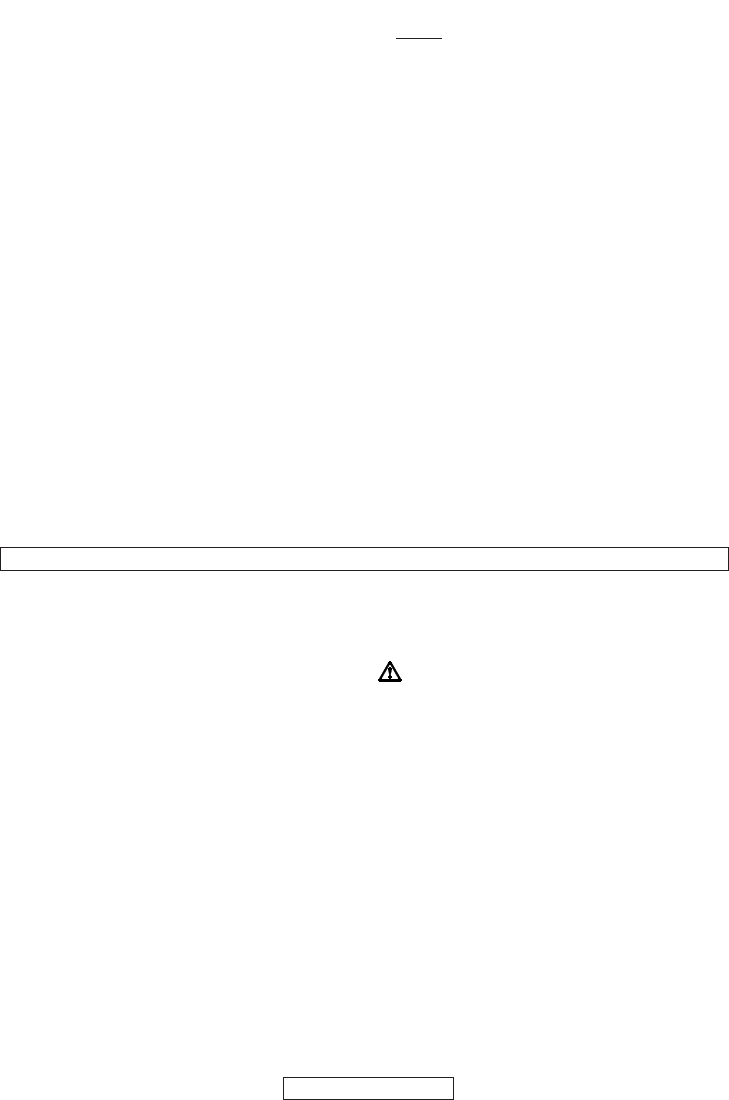
Electrical safety
1. It is recommended that you use a Residual
Current Device (R.C.D.) with a tripping current of
not more than 30mA. Even with a R.C.D.
installed 100% safety cannot be guaranteed and
safe working practice must be followed at all
times. Check your R.C.D. every time you use it.
2. Before use, examine cable for damage, replace it
if there are signs of damage or ageing.
3. Do not use the product if the electric cables are
damaged or worn.
4. Immediately disconnect from the mains electricity
supply if the cable is cut, or the insulation is
damaged. Do not touch the electric cable until
the electrical supply has been disconnected. Do
not repair a cut or damaged cable. Take the
product to an Authorised Service Centre and
have the cable replaced.
5. Always make sure that the cable/ extension cord is
kept behind the user, ensuring that it does not
create a source of danger for the user or for other
persons, and check that it cannot be damaged (by
heat, sharp objects, sharp edges, oil, etc);
6. Position the cable so that it will not be caught on
branches and the like, during cutting.
7. Always switch off at the mains before
disconnecting any plug, cable connector or
extension cable.
8. Switch off, remove plug from mains and examine
electric supply cable for damage or ageing
before
winding cable for storage. Do not repair
a damaged cable. Take the product to an
Authorised Service Centre and have the cable
replaced.
9. Remove the plug from the mains before leaving
the product unattended for any period.
10.Always wind cable carefully, avoiding kinking.
11.Use only on AC mains supply voltage shown on
the product rating label.
12.The chainsaw is double insulated to EN60745-1
& 2-13.
Cables
1. Mains cables and extensions are available from
your local Approved service centre
2. Only use approved extension cables
3. Extension cables and leads should only be used
if they are designed for outdoor use and comply
with H07 RN-F or IEC 60245 designation 66.
Use only 1.0mm
2
size cable up to 40m in length
maximum
C. SAFETY EQUIPMENT DESCRIPTION
SWITCH BLOCK
Your machine is equipped with a device (fig.1A) that
when deactivated, stops the switch from being
pressed thus preventing accidental start-up.
CHAIN BRAKE ACTION ON SWITCH RELEASE
Your machine is equipped with a device that blocks
the chain immediately as soon as the switch is
released; If this device should not work at any time,
the machine must NOT be used and must be taken
to an Authorised Service Centre.
FRONT HAND GUARD / CHAIN BRAKE LEVER
The front hand guard (fig.1B) is designed to prevent
your left hand from coming into contact with the
chain (on condition that the machine is held
correctly according to instructions). The front hand
guard also acts as a chain brake, including a device
that stops the chain in less than 0.15 of a second in
the case of kickback. The chain brake is released
when the front hand guard is pulled backwards and
clicked in position (fig.2). The chain brake is
activated when the front hand guard is pushed
forward and the chain is stopped (fig.3). The chain
brake can be activated using the left wrist by
pushing forwards, or when the wrist comes into
contact with the front hand guard as a result of
kickback.
When the machine is used with the bar in horizontal
position, for example during tree felling, the chain
brake offers less protection.(fig.4).
N.B.: When the chain brake is activated, a safety
switch cuts off all current to the motor.
Releasing the chain brake whilst the switch
is held will start the product.
CHAIN CATCHER
This machine is equipped with a chain catcher (fig.5)
located under the sprocket. This mechanism is
designed to stop the backward chain movement in the
case of chain breaking or derailing. These situations
can be avoided by ensuring correct chain tension
(Refer to chapter “D. Assembly/disassembly”).
REAR HAND GUARD
This acts to protect (fig.6) the hand in the case of
chain breaking or derailing.
ENGLISH - 5


















